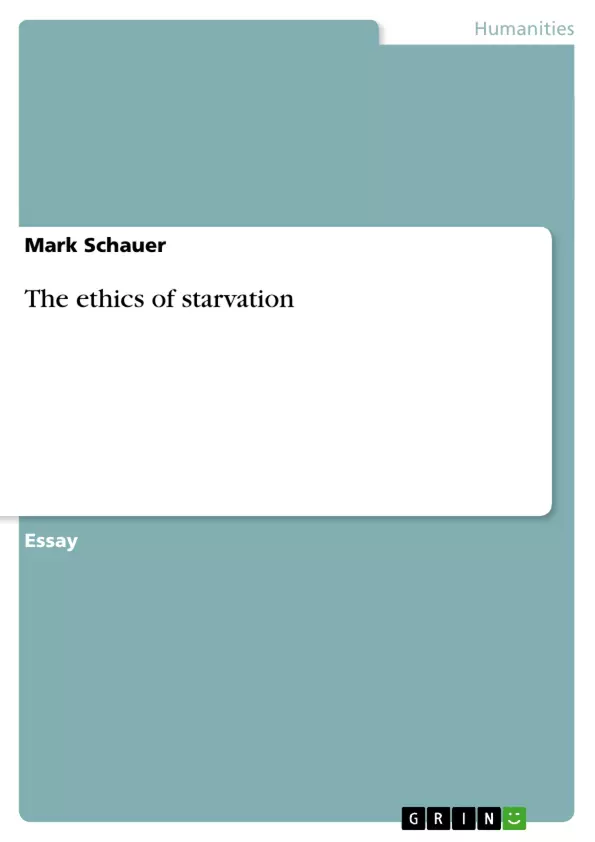Though delivering the world’s poorest citizens from starvation is an attainable goal, producing enough food to provide a standard of living comparable to the West’s is not. Efforts to preserve the world’s most fragile ecosystems are doomed when the people in them are living in extreme poverty, and the false hope of selling a poor nation’s natural resources to the industrialized world will only bring sufficient prosperity to stave off starvation until the mineral wealth has been depleted. It should be kept in mind that the world has not seen an uninterrupted advancement in technological progress, of which food is the building block — the “Dark Age” enveloped Europe when the advanced plant genetics and animal husbandry techniques of the Western Roman Empire were lost along with its collapse in the 5th century AD. The Romans, it should be added, were not particularly concerned with feeding non-Romans in foreign lands, and were brought down by peoples who were their technological inferiors.
Inhaltsverzeichnis (Table of Contents)
- Food and Morality
- Obligations to Foreigners
- The Just Desert
- Hunger, Charity, and the System
- Charity vs. Obligation
- Poverty and Environmental Degradation
Zielsetzung und Themenschwerpunkte (Objectives and Key Themes)
This work explores the ethical implications of global hunger and poverty, examining the moral obligations we have to address these issues. The text analyzes different perspectives on our responsibility to alleviate suffering, questioning whether a purely charitable approach is sufficient or whether a more systemic solution is required. Key themes include: * **Moral Obligations and Global Poverty:** Examining the ethical duties we have to individuals suffering from poverty and hunger, particularly in developing countries. * **The Role of Capitalism and Redistribution:** Analyzing competing perspectives on whether the capitalist system can effectively address poverty or if redistribution of wealth is necessary. * **The Impact of Overpopulation:** Evaluating the potential for overpopulation to exacerbate food shortages and the long-term sustainability of our food systems. * **Charity vs. Obligation:** Distinguishing between philanthropic acts of charity and a moral obligation to address systemic issues contributing to poverty and hunger. * **Environmental Degradation and Poverty:** Exploring the interconnectedness between environmental sustainability and global poverty, recognizing the potential for resource depletion to exacerbate food insecurity.Zusammenfassung der Kapitel (Chapter Summaries)
The text opens by discussing the ethical implications of global hunger and poverty, exploring the question of whether we have a moral obligation to help those in need. It examines the concept of "just desert" and analyzes the potential consequences of wealth redistribution. The chapter then delves into the debate surrounding charity and obligation, questioning whether a purely charitable approach is sufficient or if more systemic action is needed. It also examines the argument that overpopulation could potentially hinder efforts to alleviate poverty.Schlüsselwörter (Keywords)
The key themes of the text revolve around the intersection of ethics, global poverty, and food security. The work explores concepts such as moral obligation, just desert, charity, systemic change, overpopulation, and environmental degradation. It also analyzes the role of capitalism and the need for equitable distribution of resources.Frequently Asked Questions
Is it possible to provide a Western standard of living for all the world's poorest?
The text argues that while delivering citizens from starvation is attainable, producing enough food for a Western standard of living for everyone is not sustainable.
What is the difference between charity and moral obligation in this context?
The work distinguishes between philanthropic acts (charity) and a systemic moral duty to address the root causes of global poverty and hunger.
How does poverty contribute to environmental degradation?
Efforts to preserve ecosystems are doomed when people live in extreme poverty, as they may be forced to deplete natural resources just to survive.
What historical lesson is drawn from the Roman Empire regarding food?
The collapse of the Western Roman Empire led to a "Dark Age" where advanced plant genetics and husbandry techniques were lost, showing that technological progress is not always uninterrupted.
Can the capitalist system effectively address global hunger?
The text analyzes competing perspectives on whether capitalism works or if a redistribution of wealth is necessary to solve systemic poverty.
- Quote paper
- Professor Mark Schauer (Author), 2009, The ethics of starvation, Munich, GRIN Verlag, https://www.grin.com/document/230295



